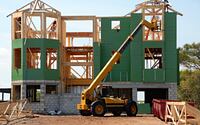5 Things You Should Know Before Taking Out a Construction Loan
Constructing a home can be expensive, but with a construction loan, all expenses are catered for. A construction loan is short-term financing that you can use to build a house from start to finish. It covers land purchase, construction materials and labor, contingency and interest reserves, plans, fees, permits, and closing costs. Here are five things you should know before taking out a construction loan.
1. How construction loans work
Construction loans have more lender involvement. With the help of a construction fund control specialist like Northwest Construction Control, the lender analyzes your projected budget, plans, and schedule to determine your loan amount. Once your loan is approved, you don’t receive the money; instead, the lender pays the contractor in intervals based on completed work.
Before releasing a draw, the lender reviews the construction progress report to ascertain that the amount spent aligns with completed work. Once the project is completed, you start repaying your loan. You may convert it into a conventional mortgage or repay your construction loan off in full.
2. Types of construction loans
Depending on your construction needs, there are various loans to choose from. They include:
– Construction to permanent loan: This loan covers a home construction then converts into a fixed-rate mortgage after the project’s completion
– Construction only loan: this is an adjustable-rate loan used to complete the construction of a home, and after completion, the loan must be repaid in full or converted into a mortgage. It needs two application processes and closings
– Owner builder loan: This loan is availed to homeowners who can showcase experience as home builders or have a contractor’s license
– Renovation loan: This loan covers a home purchase and the performance of major renovations. This is why the loan amount depends on the home’s anticipated value after renovations
– Bridging Loans: As folks from ABCFinance explain, these are short-term loans that can be used to fund a home construction and bridge the gap between the sale of an existing property and the purchase of a new one.
3. Construction loan rates
Construction loan rates differ depending on the loan term, borrower’s creditworthiness, and loan amount. Their interest rates are variable, meaning they change over the loan period based on an index. Construction loan rates usually linger around 1% point above standard mortgage rates.
4. Construction loan requirements
To access the financing you need to start your construction project, and you need to get approved for the loan. The approval process is quite rigorous since the loan won’t be secured or have collateral. Lenders have to analyze and approve the proposed budget, architectural plans, and estimated construction timelines. To get approval for a construction loan, ensure you have an excellent credit score, enough income to pay off the loan, a low debt to income rate, a down payment of at least 20%, project and construction budget approval, and builder or general contractor approval.
5. How to choose a construction lender
The process of choosing the ideal construction loan lender can be long and overwhelming. Consider the types of loans they offer and if the interest rates are fixed or variable. Determine the charge closing fees and other fees and use your equity on land as a down payment.
Endnote
The search for your dream home can be challenging, but you can build and customize it to your liking with a construction loan. Consider going through the above tips to find out everything about construction loans before applying for one.
- by Matt Watts
